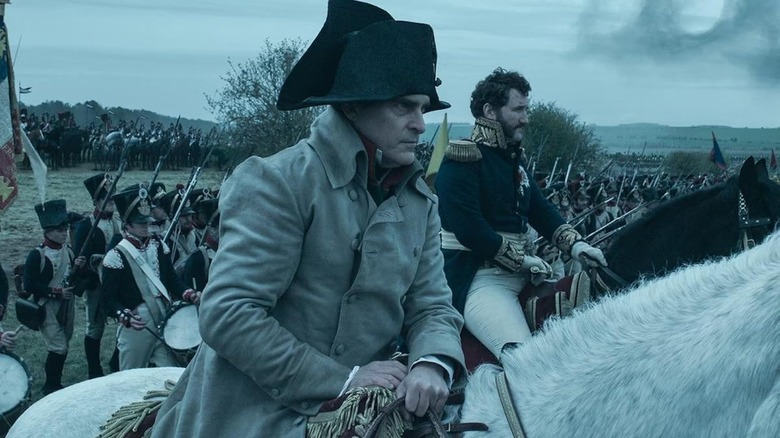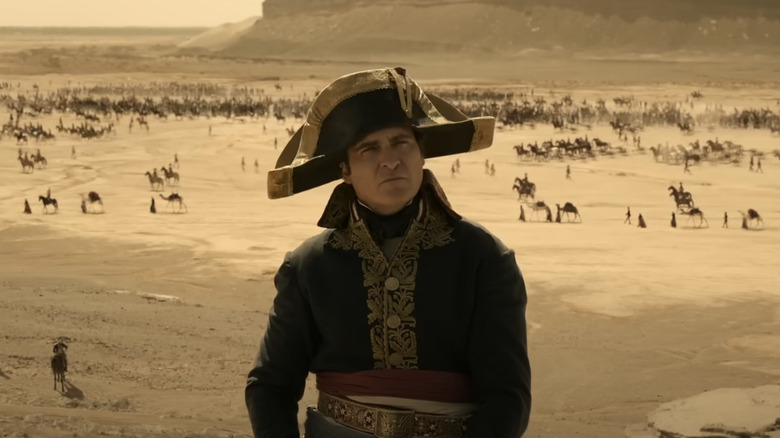The Book You Should Read If You Love – Or Hate – Ridley Scott's Napoleon
Director Ridley Scott has been having a field day during the press tour for "Napoleon," his latest blockbuster epic starring Joaquin Phoenix, generally telling every historian within earshot to shove it whenever someone points out a historical inaccuracy in his film. And quite frankly, he has the right. At 85 years old, with more than a few masterpieces under his belt, Scott should be allowed to make the movies he wants to make, and adjust the facts to fit his vision as much as he wants. Especially when the quotes about his process have proven so dang entertaining. Go off, king.
But this is the part where I invite Scott to narrow his gaze at me, and practically beg him to tell me to get f*cked. Because I've spent the past few months reading "Napoleon: A Life" by Andrew Roberts, the 2015 biography that spans over 900 pages and utilizes tens of thousands of the infamous military leader and emperor/dictator's surviving letters to paint a complete portrait of a figure so often reduced to parody. I found myself fascinated by Napoleon Bonaparte, the real man, who was as impressive as he was appalling, as brilliant as he was baffling, as genuinely important as he was a gruesome stain on history. To learn about Napoleon is to struggle with him — the man's fingerprints are so clearly all over the modern world, but so are the wounds he left behind. You hate yourself for finding him so compelling. You struggle with the fact that someone this driven and impressive could also be so monstrous. You find yourself conflicted.
And this conflict is wholly absent from Ridley Scott's movie.
Ridley Scott's Napoleon isn't historically accurate, but does that matter?
Here's the thing: I don't care that Scott throws history to the wind for the film's battle scenes and leans into myth making and striking images. How the heck do you dramatize military corps organization and successful supply lines and the logistical solutions that were so often the key to Napoleon's victories? But what struck me while watching "Napoleon" is that the film's one-note take on its title character, and Joaquin's bizarre performance, is how much less interesting it is than the real guy. The most compelling moments in Roberts' book depict a man who, on the eve of a battle where he's sending 100,000 men into combat against an army of equal size, would sit in his tent, plan battle strategy and write letters back to Paris to suggest display items for the Lourvre and help run various science academies and micromanage the creation of a system of laws that would impact societies all over the world. It's staggering, frankly. It's impossible to comprehend how one human being could get so much done.
As played by Joaquin Phoenix, Napoleon is a cuckold loser who fails upwards and whose final defeats were inevitable. In history, Napoleon's final defeats are a genuine shock because he seemed truly unstoppable. The movie is one long joke about what a pathetic moron this guy is, and while the joke is sometimes funny, it gets old long before Waterloo. I found myself wishing the film had the ambition to showcase the man seen in Roberts' masterful biography — the guy who left me fascinated and conflicted and troubled. With this one-note portrayal, Scott and Phoenix take the easy way out. (Anyway, whether you like the movie or not, Roberts' biography is one I wholly and completely recommend.)
Then again, Phoenix's bumbling performance is so in-line with much of the enemy propaganda created during Napoleon's reign that one could argue that Scott is simply doing his duty as an Englishman to drag his nation's greatest enemy through the mud one more time, 200 years later. If that's the case ... go off once again, king.
If you want to hear more, I spoke about this at length on the /Film Daily podcast, which you can listen to below:
We also talked about the latest holiday releases, including "Thanksgiving" and "The Hunger Games: The Ballad of Songbirds and Snakes," as well as some terrific books and comics you should be reading (and you really should be reading "Dark Ride," folks).
You can subscribe to /Film Daily on Apple Podcasts, Overcast, Spotify, or wherever you get your podcasts and send your feedback, questions, comments, concerns, and mailbag topics to us at bpearson@slashfilm.com. Please leave your name and general geographic location in case we mention your e-mail on the air.

